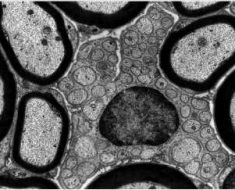Stomach bloating is a commonly reported complaint in the UK, with many people experiencing symptoms following a blowout meal. With gassy foods often to blame for the bloat, general advice says to eat less of the culprits in order to alleviate symptoms.
READ MORE
-
 Stomach bloating: Drink this tea to soothe your tummy swelling
Stomach bloating: Drink this tea to soothe your tummy swelling
If bloating symptoms persist despite making simple dietary tweaks, the tummy swelling may signify a more serious condition, however, so it is important to know the warning signs.
According to TV doctor Dr Oz, if you notice a persistently inflated abdomen or are experiencing intense pain, this may indicate the bloating is being triggered by a more serious underlying condition.
In addition, a person should contact their GP if bloating lasts longer than a week, or is accompanied by a change in bowel habits, weight loss and blood in your stool, he warns.
According to Harvard Health, Dr. Kyle Staller, a gastroenterologist at Harvard-affiliated Massachusetts General Hospital, experiencing sudden bloating when you get older may also spell trouble.

He explained: “Most people who have bloating start experiencing it at a young age. But if someone is suddenly having bloating in older age, that’s sometimes a red flag that tells me something has changed and needs to be investigated.”
If sudden bloating lasts more than a few days, report the symptom to your GP or gastroenterologist, advises Harvard Health.
What could be causing the bloat?
There are a wide-range of health complications that can give rise to abdominal pain and bloating, one of the more serious being bowel cancer.
In addition to bloating, blood in the stools and a persistent change in a person’s bowel habit are symptoms associated with bowel cancer, according to the NHS.
DON’T MISS
Stomach bloating: Tummy swelling may signify this life-threatening disease [INSIGHT]
Stomach bloating: The best fruit to beat bloating – have you tried this? [TIPS]
Stomach bloating: Taking this supplement could reduce gas and bloating [TIPS]
Persistent bloating is also a common symptom of ovarian cancer – one of the most common types of cancer in women.
As the NHS explains, ovarian cancer mainly affects women who have been through the menopause (usually over the age of 50), but it can sometimes affect younger women.
The NHS recommends you see your GP if you are feeling bloated, particularly more than 12 times a month, and if you have other symptoms of ovarian cancer that will not go away.
Other symptoms of ovarian cancer include:
- A swollen tummy
- Discomfort in your tummy or pelvic area
- Feeling full quickly when eating
- Needing to urinate more often than normal

READ MORE
-
 Stomach bloating: Eat this simple snack to beat the bloat
Stomach bloating: Eat this simple snack to beat the bloat
The symptoms are not always easy to recognise because they’re similar to those of some more common conditions, such as irritable bowel syndrome (IBS) – another underlying cause of bloating.
According to Harvard Health, other symptoms of bloating include:
- Irritable bowel syndrome, a condition characterised by a combination of symptoms (bloating, cramping, abdominal pain, diarrhoea, or constipation) that last for three or more months.
- Inflammatory bowel disease, an inflammation of the lining of the gastrointestinal tract, including Crohn’s disease and ulcerative colitis.
- Celiac disease, an autoimmune disease in which the immune system attacks the small intestine. It’s triggered by a protein called gluten that’s found in wheat, barley, and rye.
- Constipation, a condition defined by fewer than three bowel movements per week, hard or dry stools, the need to strain to move the bowels, and a sense of an incomplete evacuation.
- Gastroparesis, a sluggish emptying of food from the stomach into the small intestine.
Simple tweaks
Fortunately, most cases of bloating do not signify serious underlying conditions, and can usually be remedied by making simple lifestyle tweaks.
As a first course of treatment, the NHS says to cut down on foods known to cause wind and bloating, such as beans, onions and broccoli, but make sure you still eat five portions of fruit and vegetables a day.

If constipation is the root cause, increasing fibre intake may ease symptoms, and it’s important to get fibre from a variety of sources, as eating too much of one type of food may not provide you with a healthy balanced diet, explained the health body.
It also recommends drinking lots fluid and exercising regularly may help to banish the bloat.
It added: “Even a 20 to 30 minute brisk walk four times a week can improve your bowel function.”
Source: Read Full Article





